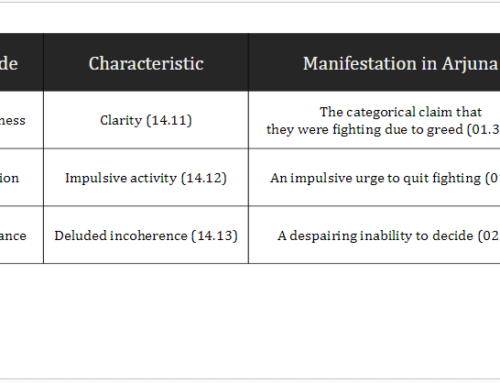The Bhagavad-gita (14.10) indicates how the subtle forces of nature known as the modes exert competing psychological influences on us. Their contrary influences cause our feelings to change rapidly, unpredictably and inexplicably, for example, from introspection (induced by the mode of goodness) to agitation (induced by the mode of passion) to frustration (induced by the mode of ignorance)
Some of us may experience this downward spiral when we try to apply sensible principles from self-help books, principles that often align with the mode of goodness. However, the horse race pace of our lifestyle catapults us into the mode of passion which creates priorities at variance with our principles. Further, passion eventually – and often inevitably – degenerates into ignorance; our unbalanced priorities create relentless stress that makes us seek relief in self-defeating practices, indulgences that offer fleeting pleasures and lasting troubles.
Principles in goodness, priorities in passion, practices in ignorance – this aptly describes the fate of self-help.
The Gita (14.26) points the way to real self-help: seek divine help. Devotional service connects us with a power greater than the power of the modes: the power of Krishna. That divine connection empowers us to resist and reject the self-sabotaging influences of the modes. Only then can we harmonize our principles, priorities and practices, and gradually experience fulfillment internally and achievement externally.
Bhagavad Gita Chapter 14 Text 10
“Sometimes the mode of goodness becomes prominent, defeating the modes of passion and ignorance, O son of Bharata. Sometimes the mode of passion defeats goodness and ignorance, and at other times ignorance defeats goodness and passion. In this way there is always competition for supremacy.”


Leave A Comment